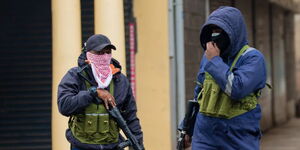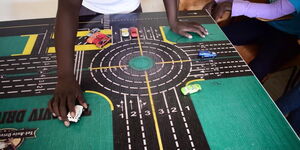By now, you have come across videos or stories of Kenyan women seeking justice over alleged sexual exploitation by British soldiers in Laikipia. But these cases are often an uphill battle that even the National Assembly has had little to no progress in untangling.
A UK government report released on Tuesday, following an inquiry into the incidents, has shed light on why it is often nearly impossible for Kenyan women to prove their allegations. The British Army investigation found 35 instances where there was at least an initial suggestion or allegation of transactional sex by the British Army Training Unit Kenya (BATUK) soldiers.
Since October 2022, only one of these 35 instances was found to be proven, despite the Army’s zero-tolerance policy being fully implemented in November that year. Earlier parliamentary responses noted that “24 incidents of service personnel’s suspected engagement in transactional sex in Kenya have been investigated… none of which have been proven” as of May 2024.
The Service Inquiry concluded that “transactional sex in Kenya is exceptionally difficult to prove, with none of the parties involved incentivised to make admissions.” Investigators cited a lack of incentive for sex workers to speak out, strong disincentives for soldiers to confess, insufficient circumstantial evidence, and the legitimacy of personal relationships.
The report noted that Kenyan sex workers widely believe sex work to be illegal, even though, as in the UK, only soliciting is prohibited. “This makes admissions highly unlikely,” it stated, adding that fears police may not treat crimes against sex workers seriously further silence victims.
For soldiers, the Ministry of Defence’s “presumption of discharge” policy for those found guilty of transactional sex overseas serves as a powerful deterrent to coming forward. The inquiry warned that “circumstantial evidence will rarely be sufficient on its own,” citing examples such as a soldier merely being seen with a Kenyan woman.
It also stressed that not every sexual encounter between a soldier and a Kenyan is exploitative or transactional. “Soldiers are entitled to form personal relationships,” the report said, underscoring the difficulty in drawing clear lines.
Despite the low number of proven cases, a confidential survey suggested a higher prevalence. When asked if they knew of other soldiers engaging in sexual activity with locals in exchange for money, favours, or goods, “11 per cent (238) of soldiers answered ‘yes’.” The Independent Advisor cautioned that the lack of successful prosecutions could lead soldiers to conclude they can “breach JSP 769 with effective impunity.”
Other obstacles to investigations include restrictions on anonymised medical data and the small population size, which makes it hard to separate transactional sex from other relationships or imported infections. Under the Defence Cooperation Agreement, most serious sexual assault cases fall under Kenyan jurisdiction, unless explicitly waived, adding legal complexity.
Victim support initiatives are also faltering. Representatives from the Kenya Sex Workers Alliance (KESWA) told investigators they were unaware of an anonymous hotline for Sexual and Gender-Based Violence and said the Nanyuki POLICARE Centre “was not working” in practice. The report flagged a lack of co-production with local groups in designing such services.
To close the gap, the inquiry has recommended adopting a “presumption in favour of AGAI 67” for alleged transactional sex cases, which uses a lower “balance of probabilities” threshold rather than the criminal justice system’s higher burden of proof. “This is the process most likely to enable findings of transactional sex to be made,” it concluded.
Ultimately, the report found it is “more likely than not” that transactional sex involving British soldiers is still happening in Kenya. While the scale is described as “low to moderate” and not out of control, the Army was urged to “assume it may be at the upper end of that scale” and maintain its efforts to root it out.












